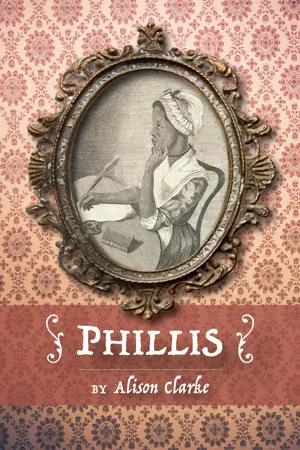![]()
Part I
Lector,
Si Monumentum Requiris,
Circumspice
![]()
My Name Is—
My name, my name on this Earth is Phillis—the name from the ship that I was on. The Beast Of Death. I remember the people, the sailors uttering it. I remember like a mantra tainted with poison. Inside I flinch when that name was called, especially by my Master and Mistress. It’s not easy, no, it is not easy. You get used to it, but not really, that pain, that gut flinch still remains, but I keep silent.
Now that I am on a new course that pulses through my veins, they say, The Ancestors say, “You are now Siptoraaki.” Memories that seep through: like the sap of a tree. Flashes of Dreams run through the pathways of the brain: that collective co-mingling. So much was blocked out. So much was lost when I got on that ship. I think the Ancestors were protecting me, so I wouldn’t Remember. It was too much. It Just It was a gift, really, a way I could stay alive, so that I wouldn’t be eaten out from my insides. So that the Pain would not cut me into two. Being on this ethereal plane, I remember in my mortal life, that sometimes, I felt like I was two people—the Phillis on the Earth, part of the mortal realm, that The Master and Mistress called upon, their model poet, artist, their “experiment” on display, their pet, and the other me—Griot, soothsayer, Teller Of Story, Daughter Of The Fulani, Keeper Of Secrets, Revealing Only what is necessary, keeping our Life, those private things, private. I think they took enough from us, they will not be privy to our private thoughts too. Mama knew this. She knew: “Reveal only what is necessary. Say only what is necessary. Your life with us, the stories, the coming together at the fire, the hearth, seeing the stars as the words fell out of our Elders’ mouths, flying like the golden embers from the fire . . . Keep that for you, keep that in your heart, in that wooden chest, that is for you. It is enough. Allude to what you have lost, sing through your lays what you have lost, but those details, intimate, keep that for You, and you alone. You deserve that much. You are creating art so you can free your people. Do what you have to do, but don’t give everything away. Keep that part for you, and for you alone. Yes, that is enough, my Daughter. It is enough.”
![]()
Chrysalis
Lifeless In An Aquatic Tomb: that is how I felt, on this floating death trap, ship of oak, snow-tint sails shouting into the wind.
The slaves were whipped—forced to—the music a macabre possession: seizures Of—The Dance . . . Exercise? Futile, too dehydrated, too hungry, fed once a day, if we were lucky . . . the food in buckets, people fighting for scraps, mush, and still in chains. The survival of the—no, the most lucky?
Shackled Africans beating on an Akan drum the patent rhythms of a neighbouring tribe whose land was all green-clad mountains . . . it was an internal hum, a pulsating beat resonance, of timeless time. Son of a chief, a gift, symbol that would reverberate, creating a troubling music. The ancestors nodded, hovering in a cloud of light: women, skin a light mahogany, or a deep mocha, dressed in bright clothing, fuchsia, indigo, gold and emerald. This music, The Drum, this haunting, an art form, but now: The Suffering . . .
The faces of the drummers—Masks: a convulsing, a mourning that could not be too horrifying, as the slavers would see, and more bodies would be hurled overboard. Feet, tension: like walking on fragments of glass, veins throbbing.
I want to pray, pay homage, while facing the rising sun, but I can’t. The ones with blanched skin, I don’t think they would understand. They might see it as an affront. I remember thinking this, even as a child. I remember. What was important was to Survive, and sometimes that meant great compromise.
The sludge, the waves of urine, feces, sweat, the stench As I walked, seesawing, in the bow of the ship, not steadily, for the element was turmoiled.
When I could climb to the deck, I witnessed Horrors that no child should see. Violations I still cannot speak of. A grotesque cavorting of bodies, a co-joining of limbs, male and female, forced together.
But the gyring slaves, chained together, was maddening, and the beating of the drum, the drum, preacher of our homeland Mother Africa, made pride seem torture. The Beauty, now mired, driven through the muck . . . What would mother and father say? I know what they would do: sob, slump, collapse, grasping onto silence, and look for escape, a way to kill, or a way to kill themselves. nothing will ever be the same.
I was taken, my Africa forsaken. My mother’s cries, her crazed eyes, My father shrinking, shrivelling, bloody. nothing to be done. She was so helpless. And my father, if you could see, Something I never want to remember. And so—Here I am. On this ship for I know not where, but no place with warmth of the kind sun. There are no friends out here, and I don’t know what to do. But the ancestors say: Do what you have to do: survive. You Are The chosen one.
And You Must survive. The ode to the Morning Sun, A Pouring Out Of Water But that was useless. It didn’t matter. It didn’t keep me safe.
![]()
Summer 1761: The Wharf
Months later . . . And now I am landed . . .
And people with very bleached skin, hover about, in greater numbers,
Jabbering gi...




